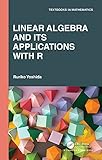Linear algebra and its applications with R / Ruriko Yoshida, Naval Postgraduate School.
Material type: TextSeries: Textbooks in mathematicsPublisher: Boca Raton : Chapman & Hall/CRC Press, 2021Edition: First editionDescription: 1 online resourceContent type: text Media type: computer Carrier type: online resourceISBN: 9781003042259Subject(s): Algebras, Linear -- Data processingDDC classification: 512.5 Summary: "The book developed from the need to teach a linear algebra course to students focused on data science and bioinformatics programs. These students tend not to realize the importance of linear algebra in applied sciences since traditional linear algebra courses tend to cover mathematical contexts but not the computational aspect of linear algebra or its applications to data science and bioinformatics. The author presents the topics in a traditional course yet offers lectures as well as lab exercises on simulated and empirical data sets. This textbook provides students a theoretical basis which can then be applied to the practical R and Python problems, providing the tools needed for real-world applications. Each section starts with working examples to demonstrate how tools from linear algebra can help solve problems in applied science. These exercises start from easy computations, such as computing determinants of matrices, to practical applications on simulated and empirical data sets with R so that students learn how to get started with R along with computational examples in each section and then they learn how to apply what they learn to problems in applied sciences. This book is designed from first principles to demonstrate the importance of linear algebra through working computational examples with R and python including tutorials on how to install R in the Appendix. If a student has never seen R, they can get started without any additional help. Since Python is one of the most popular languages in data science, optimization, and computer science, code supplements are available for students who feel more comfortable with Python. R is used primarily for computational examples to develop student's practical computational skills"-- Provided by publisher.
TextSeries: Textbooks in mathematicsPublisher: Boca Raton : Chapman & Hall/CRC Press, 2021Edition: First editionDescription: 1 online resourceContent type: text Media type: computer Carrier type: online resourceISBN: 9781003042259Subject(s): Algebras, Linear -- Data processingDDC classification: 512.5 Summary: "The book developed from the need to teach a linear algebra course to students focused on data science and bioinformatics programs. These students tend not to realize the importance of linear algebra in applied sciences since traditional linear algebra courses tend to cover mathematical contexts but not the computational aspect of linear algebra or its applications to data science and bioinformatics. The author presents the topics in a traditional course yet offers lectures as well as lab exercises on simulated and empirical data sets. This textbook provides students a theoretical basis which can then be applied to the practical R and Python problems, providing the tools needed for real-world applications. Each section starts with working examples to demonstrate how tools from linear algebra can help solve problems in applied science. These exercises start from easy computations, such as computing determinants of matrices, to practical applications on simulated and empirical data sets with R so that students learn how to get started with R along with computational examples in each section and then they learn how to apply what they learn to problems in applied sciences. This book is designed from first principles to demonstrate the importance of linear algebra through working computational examples with R and python including tutorials on how to install R in the Appendix. If a student has never seen R, they can get started without any additional help. Since Python is one of the most popular languages in data science, optimization, and computer science, code supplements are available for students who feel more comfortable with Python. R is used primarily for computational examples to develop student's practical computational skills"-- Provided by publisher.
| Item type | Current library | Call number | Status | Date due | Barcode | Item holds |
|---|---|---|---|---|---|---|
 Books
Books
|
Namal Library Mathematics | 512.5 YOS-L 2021 13538 (Browse shelf (Opens below)) | Available | 0013538 |
Includes bibliographical references and index.
"The book developed from the need to teach a linear algebra course to students focused on data science and bioinformatics programs. These students tend not to realize the importance of linear algebra in applied sciences since traditional linear algebra courses tend to cover mathematical contexts but not the computational aspect of linear algebra or its applications to data science and bioinformatics. The author presents the topics in a traditional course yet offers lectures as well as lab exercises on simulated and empirical data sets. This textbook provides students a theoretical basis which can then be applied to the practical R and Python problems, providing the tools needed for real-world applications. Each section starts with working examples to demonstrate how tools from linear algebra can help solve problems in applied science. These exercises start from easy computations, such as computing determinants of matrices, to practical applications on simulated and empirical data sets with R so that students learn how to get started with R along with computational examples in each section and then they learn how to apply what they learn to problems in applied sciences. This book is designed from first principles to demonstrate the importance of linear algebra through working computational examples with R and python including tutorials on how to install R in the Appendix. If a student has never seen R, they can get started without any additional help. Since Python is one of the most popular languages in data science, optimization, and computer science, code supplements are available for students who feel more comfortable with Python. R is used primarily for computational examples to develop student's practical computational skills"-- Provided by publisher.
Description based on print version record.


There are no comments on this title.